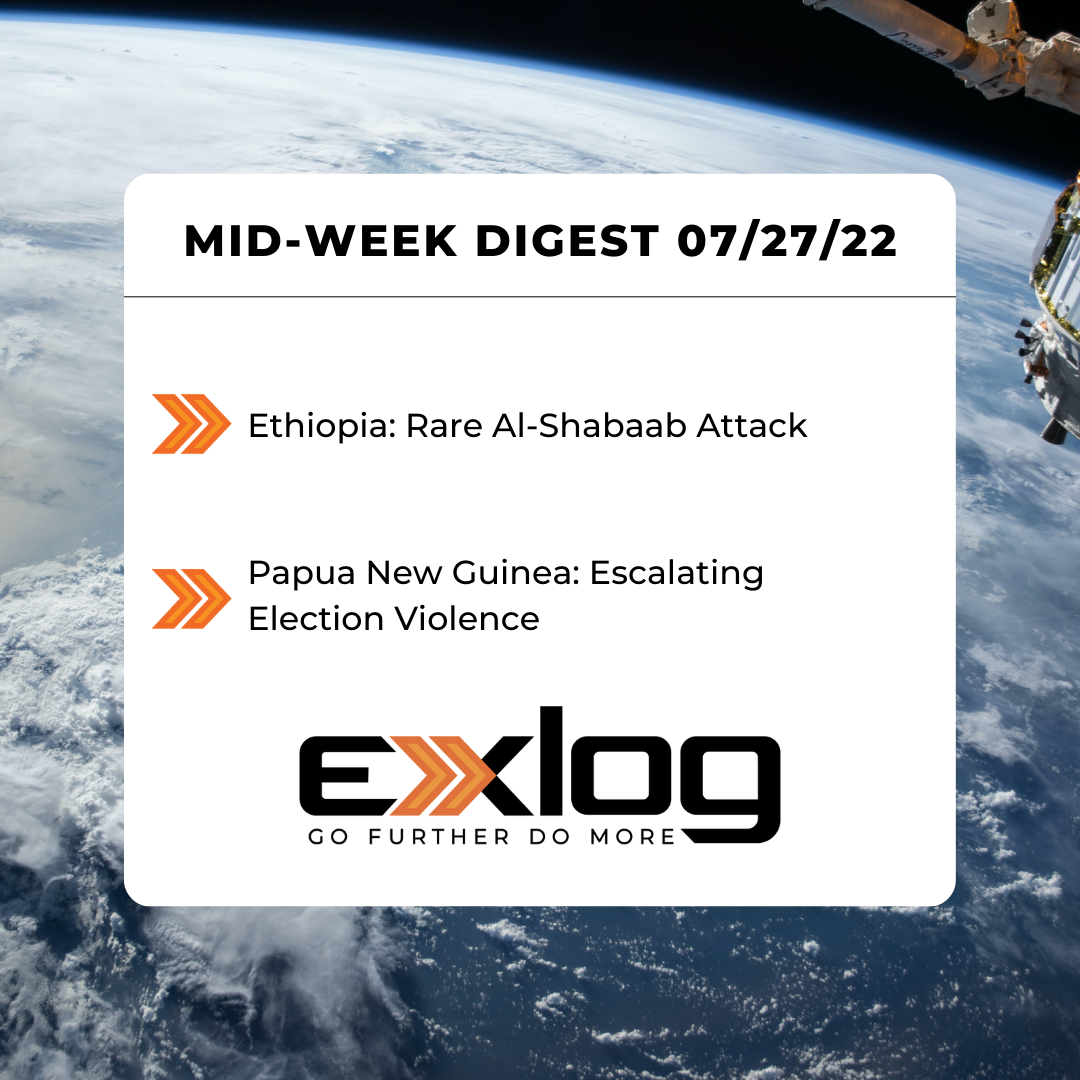Rare Al-Shabaab Attack in Ethiopia and Escalating Election Violence in Papua New Guinea
Ethiopia: Increased Al-Shabaab Activity Near Somalia Border
A rare Al-Shabaab attack in Ethiopia’s Somali region highlights the volatility of the security environment on the Somali-Ethiopian border and suggests efforts by the militant group to expand operations into Ethiopia amid ongoing civil and ethnic conflicts in the country. Al-Shabaab militants clashed with Ethiopian police in the Afder area of Somali, as well as in two towns in Somalia’s Bakool – the region that borders Ethiopia – on July 20. Casualty figures are unconfirmed, although media reports indicate that 14 Ethiopian police and three civilians were killed. Somali military officials in Bakool claim that at least 63 Al-Shabaab militants were also killed in the clashes. The incident comes on the heels of the killing of an Al-Shabaab commander by security forces in the same area of the Somali region on July 14; according to Ethiopian authorities, the commander had allegedly crossed into Ethiopia to create a local Al-Shabaab unit. To date, Al–Shabaab’s attempts to establish a cell in Ethiopia have been unsuccessful due to the robust Ethiopian security presence in the region, as well as inside Somalia, where they form part of the African Union Transition Mission in Somalia (ATMIS) peacekeeping unit. However, the Tigray conflict in northern Ethiopia has led to heavy attrition among the country’s military forces and siphoned troops away from other volatile areas within Ethiopia and from Somalia. Furthermore, the capabilities of the local Liyu police to resist Al-Shabaab attacks in the Somali and Oromia regions are limited; without military support, certain border areas are vulnerable to external militant threats. Following the recent clashes, Ethiopian officials claim that a large group of Al-Shabaab fighters remains in Ethiopia’s Somali region, citing a confrontation between Ethiopian security forces and Al-Shabaab militants in the Ferfer district on July 25. This suggests militant activity of the kind reported on July 20 is not likely to be an isolated incident. Al-Shabaab has historically targeted other African nations participating in the peacekeeping mission in Somalia. For instance, the group has carried out numerous attacks against civilians, government officials and security forces in Kenya – particularly in its northeastern region bordering Somalia – since 2011. In the absence of a strong retaliation from Addis Ababa and additional military deployments to the region, increased Al-Shabaab activity in Ethiopia’s border areas is likely in the short-to-medium term.
Papua New Guinea: Elections Marred by Casualties, Property Damage
The security environment continues to deteriorate in Papua New Guinea as election-related violence and tribal conflicts have resulted in casualties and triggered internal displacement in recent weeks. The country recorded 50 election-related deaths since May, with 22 of the victims killed since voting began on July 4. Public frustration over mismanagement of the voting process – including missing ballot boxes, candidate rivalries, and an out-of-date voting registrar – has fueled most of the violence. Critics have blamed the Election Commission for failing to adequately prepare for the vote despite the precedent of violent election periods in 2017 and 2012. Incidents of political violence have ranged from asset attacks and property damage to clashes between supporters of rival candidates, which resulted in casualties and interruptions to travel and business operations in the capital of Port Moresby on July 25. Commercial establishments in the capital that closed to allow their employees to vote have been losing PGK 3.5 million (approximately USD 1 million) a day due to several election delays. In an attempt to quell disorder and boost security, the government redeployed security forces to polling stations; however, this move has also created a security vacuum in areas vulnerable to tribal conflicts, which tend to escalate during the election period. On July 19, a dispute between warrying tribes over a gold mine in the Porgera village, Enga Province, left more than 21 people dead and displaced 3,000 others. The fighting damaged educational and medical facilities, as well as travel infrastructure, complicating deliveries of food, fuel, and medical supplies. The incident prompted Prime Minister James Marape to declare a state of emergency in the province on July 21 and request additional resources from the military to respond to the conflict. Given the government’s inability to address the issues within the Election Commission until the end of the elections, further incidents of political and communal violence are likely at least until the ballot processing concludes on August 12.


